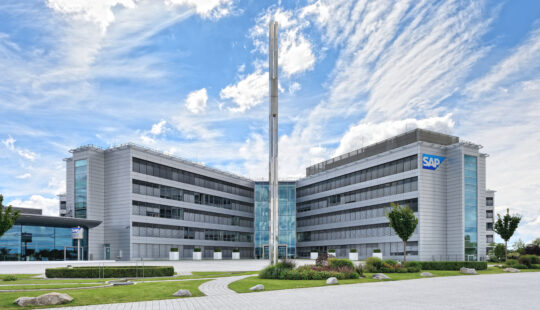There are infinite possibilities to change the world. To put a number to it, consider that there are 1.2 billion people in the age group of 15-24 across the world — that is 1.2 billion possibilities for change!
The number represents young leaders who are courageous, curious, creative, flexible, open-minded, and, most importantly, doers. Some call them Possibilists. These individuals are trying to empower themselves and others to solve the issues of the world and striving to maximize their agency and potential.
As a young changemaker myself, I recently joined SAP through a partnership with Atlas Corps. I continue to be incredibly inspired by my peers all over the world. I’m particularly inspired by those I’ve met through partnerships with SAP and their commitment to zero inequality. Last year alone, SAP Corporate Social Responsibility programs reached more than 4.5 million youth and 117,000 teachers across 113 countries, in addition to partnering with nearly 1,600 social impact organizations.
Between World Youth Skills Day on July 15 and International Youth Day on August 12, I am delighted to work with a cohort of young changemakers and writers across SAP to bring stories of inspiration, impact, resilience, and creativity.
The Possibilists
On June 15, Ashoka ChangemakerXChange released the Possibilist study, supported by SAP, Google.org, and the Vienna University of Economics and Business (Wirtschaftsuniversität Wien). Surveying 1,000 social entrepreneurs representing 137 countries from 16 of the world’s leading youth social innovation networks, the study focused on the unique needs and challenges of young changemakers, and how organizations support these Possibilists.
The International Labour Organization estimates indicate that youth employment fell 8.7% in 2020, compared to 3.7% for adults, with the most pronounced fall seen in middle-income countries. The consequences of this disruption to the early labor market experiences of youth could last for years.
According to the Possibilist study, 60% experience a lack of personal financial security, yet 80% of youth report that the COVID-19 pandemic increased their wish to make a change in the world. Around 58% of young changemakers also said that the pandemic has increased their capacity to deliver change in the world. Some of them dedicate everything they have to tackling the most pressing issues of our time. Choosing purpose over paychecks, these Possibilists are unstoppable.
The pandemic has pushed everyone to find new ways to solve challenges big or small. I was particularly inspired when I heard Ryan Gersava speak during the initial read out of the Possibilist study. Gersava is the founder and president at Virtualahan, an impact-driven company that breaks down employment barriers for intersectional groups of individuals who are often discriminated at jobs because of their conditions or former life.
Gersava partnered with SAP in 2020 through the SAP Social Sabbatical program. While he is just one example of redefining youth in action, his story is powerful. Here are four key learnings from our conversation.
1. Personal Sustainability Is a Shared Responsibility
Personal sustainability is an equal responsibility when you run a company. Often, the focus is heavily on others and not on ourselves. Social impact leaders don’t put enough value on their personal well-being, forgetting that it is at the cost of the health of the company. This is not about the person leading alone, but everyone being part of the company. Gersava emphasizes on the importance of work, though the internal struggle is not something to be ignored: “We need a systemic solution to support young changemakers, so we don’t reach our breaking point.”
2. Intention Without Investment Is Futile
Even when there is awareness and intention, what really is required is investment, in terms of time, effort, and resources. Organizations should invest in a resident psychologist, irrespective of whether they are dealing with vulnerable communities or not.
3. Power of Internal Changemakers
Every organization should invest in internal or “resident” changemakers who can bring a vital fresh perspective and respect people’s time, efforts, stories, and inspiration. A mandatory policy to support changemakers should be in place. Like Gersava, 93% of SAP’s workforce of more than 103,000 acknowledges the importance of pursuing purpose.
4. Shift from Founder-Focused to Purpose-Driven Organizations
“During the early days of social entrepreneurship, most companies are very founder-centric,” Gersava shared. “When that happens, the founder can no longer do his work because all his efforts and energy goes into meeting people who are equally or more inspiring than him.” He says he is proud that his organization has reached a point where the purpose will live on even if the founder doesn’t.
The world will always need more good news, stories like Gersava’s, of curiosity leading to courage leading to change. I have faith that the Possibilists will continue to be the source of inspiration and action for years to come, redefining what we think youth are capable of. I’m lucky to see many of these young leaders in action, and I’m honored to tell their stories over the course of the next few weeks. They are the current and future leaders who we need to accelerate innovation and provide fresh ways of thinking to decade old problems.
SAP is committed to helping the world run better and improve people’s lives, with youth playing a critical role. Join me in sharing the good news by tagging your stories of inspirational youth or your actions inspiring youth with SAP4Good on Instagram, Twitter, and Facebook.
Daliya Manuel is a marketing and communications fellow with SAP Corporate Social Responsibility.



